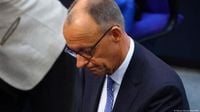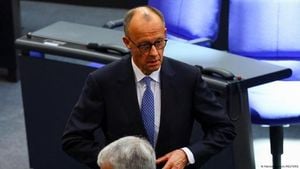In a historic turn of events, Friedrich Merz's aspirations to become the Chancellor of Germany faced a significant setback on May 6, 2025, as he failed to secure the necessary votes in the Bundestag. This unprecedented failure marks the first time in post-war German history that a chancellor-in-waiting has not garnered the required parliamentary majority in the first round of voting.
Merz, leader of the Christian Democratic Union (CDU), received only 310 votes in favor, falling short of the 316 needed for a majority in the secret ballot. The outcome stunned observers and raised questions about the stability of his proposed coalition with the center-left Social Democrats (SPD), which holds 328 seats between them. With 307 votes against him and three abstentions, the coalition's inability to unite its members has left many political analysts bewildered.
In the wake of this electoral blow, the far-right Alternative for Germany (AfD) party has called for Merz to step aside and for fresh elections, suggesting that the results reflect the fragile foundation of the coalition. AfD leader Alice Weidel stated, "This shows the weak foundation on which the small coalition of the CDU/CSU and the SPD, which was voted out by the citizens, is built." This sentiment underscores the growing discontent within the political landscape, as the AfD positions itself as a formidable opposition party.
Franziska Brantner, co-leader of the Green Party, echoed concerns about the coalition's viability, stating, "We want a government capable of taking action for Europe and Germany." She pointed out that both the CDU/CSU and SPD must prove their ability to govern effectively, not just in the immediate future but for the entire four-year term.
The implications of Merz's failed election were felt across financial markets, with Germany's DAX stock index dropping by 1.1% to 23,084 points shortly after the vote. This decline came after a brief rise earlier in the day, indicating investor anxiety over the political uncertainty. The EuroStoxx 50 also fell by 0.7%, reflecting broader concerns about the stability of European markets amidst shifting political dynamics.
Merz's defeat is particularly striking given the context of recent political maneuvers. He had previously secured a coalition deal with the SPD, which had garnered only 16.4% of the vote in the last election, its worst performance in post-war history. This coalition was seen as a necessary alliance to form a government after the CDU emerged as the leading party with 28.5% of the vote.
As the dust settles from this unexpected turn of events, the Bundestag is expected to convene again to discuss the next steps. According to German law, a second round of voting must take place within 14 days if no candidate secures an absolute majority. This process could lead to further instability if a new candidate is not quickly identified or if the coalition partners cannot agree on a path forward.
While the immediate future of Merz's chancellorship remains uncertain, his leadership has already faced scrutiny. Critics within his party have expressed concerns over his popularity and the compromises made to form a coalition with the SPD. Some party members argue that Merz has strayed from core CDU principles in pursuit of power, a sentiment echoed by the AfD, which has accused him of "electoral fraud" for not honoring the party's manifesto pledges.
In light of these developments, political observers are closely monitoring the situation, as the potential for a fresh election looms. If a second voting round fails to produce a clear winner, the Bundestag may find itself in a situation where a new election is required, further complicating Germany's political landscape.
Meanwhile, the economic repercussions of the political turmoil are already manifesting. The DAX index, which had been buoyed by investor confidence in Merz's proposed investment plans in defense and infrastructure, has seen a sharp decline. This downturn highlights the interconnectedness of politics and economics, as uncertainty in governance can lead to volatility in financial markets.
As Germany navigates this unprecedented political landscape, the outcome of Merz's candidacy will likely have lasting implications for the country's governance and economic stability. With the eyes of Europe upon them, the parties involved must find a way to restore confidence and stability in the coming weeks.
In conclusion, Friedrich Merz's failure to secure the chancellorship in the first round of voting has set the stage for an uncertain political future in Germany. As discussions on the next steps unfold, the focus will be on whether the coalition can regroup and present a united front or if the country will be thrust into a new electoral cycle amidst growing political tensions.




